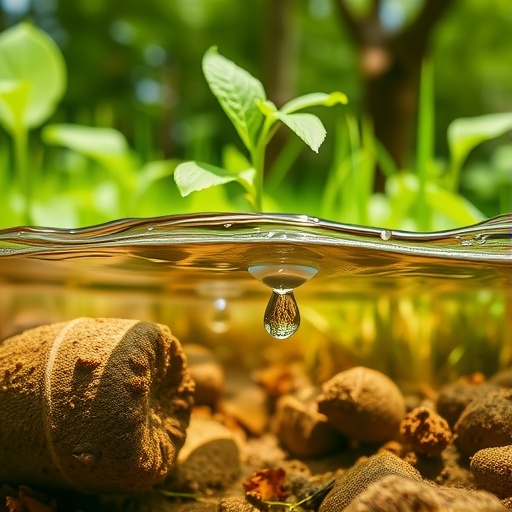Groundwater is often heralded as a crucial resource in agricultural ecosystems, sustaining both crop production and drinking water supplies. However, recent research highlights a troubling trend in this essential water source: pesticide contamination. In their comprehensive study, Acharya, Paramaguru, and Tripathi explore the multifaceted processes that lead to pesticide pollution in groundwater, examining the resulting risks and presenting an array of potential mitigation strategies. Such scrutiny is essential, as the implications of pesticide runoff extend far beyond agriculture, posing serious threats to public health and ecological stability.
As agriculture intensifies around the globe, the reliance on chemical fertilizers and pesticides has surged. These substances, designed to improve crop yield and ward off pests, often find their way into groundwater systems through various pathways, such as surface runoff, leaching, and agricultural practices. The study emphasizes that this contamination is not only a localized issue but also has the potential for widespread impact, affecting multiple aquifers and ecosystems. The researchers underscore the need for a thorough understanding of how these chemicals behave in different soil types and climatic conditions, as this will inform better management practices.
The risks associated with pesticide contamination cannot be overstated. Groundwater serves as a primary source of drinking water for an estimated 2 billion people worldwide. When pesticides infiltrate these supplies, they pose health risks ranging from acute poisoning to long-term chronic conditions such as cancers, endocrine disruption, and reproductive issues. Notably, vulnerable populations, such as children and pregnant women, are disproportionately affected, raising ethical concerns about agricultural policies and practices that prioritize short-term economic gain over long-term public health.
In their investigation, the authors outline the various classes of pesticides commonly found in groundwater, ranging from herbicides to insecticides. Each class has distinct chemical properties that influence their movement through soil and their potential for leaching into aquifers. For instance, certain persistent organic pollutants have been shown to travel deep into the soil, making their way into groundwater reserves long after their application, while other less stable compounds degrade quickly, presenting a different risk profile. Understanding these differences is paramount for regulators and farmers in making informed decisions about pesticide use.
The research also delves into the unique role of agricultural practices in exacerbating or mitigating groundwater contamination. Conventional farming methods, such as excessive tillage and over-reliance on chemical applications, often exacerbate the problem, leading to increased erosion and runoff. Conversely, sustainable practices such as crop rotation, cover cropping, and integrated pest management can significantly reduce instances of pesticide leaching. By emphasizing the importance of adopting these practices, the authors provide a roadmap for the agricultural community to follow, demonstrating that a transition to sustainability is not only feasible but necessary.
Moreover, the study highlights the role of policy and regulatory frameworks in addressing pesticide pollution. Effective governance is essential for enforcing regulations that limit pesticide application near vulnerable water sources, as well as for promoting best practices in pesticide usage. The authors argue for increased collaboration between government agencies, agricultural bodies, and researchers to ensure that policies are science-driven and aligned with public health objectives. By implementing robust monitoring systems and public awareness campaigns, communities can work towards safeguarding their groundwater reserves against contamination.
Another noteworthy aspect presented in the research is the potential for remediation technologies to combat pesticide pollution in groundwater. Various strategies, such as bioremediation and phytoremediation, are currently being explored as viable solutions to reclaim contaminated water sources. These techniques harness the natural capabilities of microorganisms and plants to degrade or absorb harmful chemicals, offering eco-friendly alternatives to conventional remediation methods. However, the researchers caution that while these technological advances show promise, ongoing research and field trials are needed to evaluate their effectiveness fully.
The researchers also caution that overcoming pesticide contamination in groundwater is not merely a matter of technological fixes; it requires significant cultural shifts within agricultural communities. Farmers must change their perception of pesticides from a necessary evil to a resource that, when mismanaged, jeopardizes their health and future crop production. Education plays a key role in this transformation, with outreach initiatives that foster a deeper understanding of the risks and encourage innovative practices rooted in sustainability.
The piece concludes by reiterating that while the challenges posed by pesticide contamination are complex, they are not insurmountable. By uniting scientific research with proactive measures, communities can begin to address this pervasive issue effectively. The demand for clean water continues to rise, and with it, the necessity for robust solutions to minimize groundwater contamination. The future of agriculture—and public health—rests on our collective ability to confront these challenges head-on, transforming practices and policies to ensure the sustainability of this vital resource.
Acharya, Paramaguru, and Tripathi’s work serves as both a clarion call and a guide, providing invaluable insights into a problem that affects millions. It reminds us that the relationship between agriculture and water is intricate and critical to address. Our choices today will determine the quality of groundwater available for generations to come, making it imperative that we remain vigilant in our efforts to safeguard this essential resource.
Subject of Research: Pesticide contamination in groundwater.
Article Title: Pesticide contamination in groundwater: processes, risks, and mitigation strategies.
Article References: Acharya, L.K., Paramaguru, P.K., Tripathi, K. et al. Pesticide contamination in groundwater: processes, risks, and mitigation strategies. Discov Agric 3, 152 (2025). https://doi.org/10.1007/s44279-025-00337-x
Image Credits: AI Generated
DOI:
Keywords: Pesticide pollution, groundwater contamination, agricultural practices, public health, remediation strategies.




